Doceaqualip 80mg Injection
$320.00 – $1,400.00
| Pack Size | Price | Price / Unit | Quantity | |
|---|---|---|---|---|
| 1 Injection | $320.00 | $320.00/ unit | ||
| 3 Injections | $900.00 | $300.00/ unit | ||
| 5 Injections | $1,400.00 | $280.00/ unit |
Want to order in bulk / B2B price ? | Send Inquiry |


| SKU | 11259 |
| Manufacturer | Intas Pharmaceuticals Ltd |
| Categories | Anti Cancer |
| Delivery Time | 10 - 14 Working Days |
| Strength | 80mg |
Introduction to Doceaqualip 80mg Injection
Doceaqualip 80mg Injection is an anti-cancer medication that contains Docetaxel, a chemotherapy drug belonging to the taxane class. It is primarily used to treat various types of cancers, including breast cancer, non-small cell lung cancer, prostate cancer, stomach cancer, and head and neck cancer.
The injection is administered intravenously under the supervision of a qualified oncologist. Docetaxel works by inhibiting the growth and spread of cancer cells. It does this by stabilizing the microtubule structure inside the cell, thereby interfering with normal cell division.
This prevents cancer cells from multiplying and leads to their eventual death. The drug is often used in combination with other chemotherapy agents to enhance effectiveness. Doceaqualip is formulated with Lipid-based Nanoparticle (LNP) technology, which may help reduce certain side effects and improve drug delivery to tumor tissues.
Like all chemotherapy agents, this injection can have significant side effects and must be used with regular medical monitoring. It is available only by prescription and should be used strictly as advised by an oncologist.
Uses of Doceaqualip 80 mg
Doceaqualip 80mg Injection is used for the treatment of various types of cancers. Its primary uses include:
- Breast Cancer
- Non-Small Cell Lung Cancer (NSCLC)
- Prostate Cancer
- Gastric Cancer
- Head and Neck Cancers
- Ovarian Cancer
- Bladder Cancer
How Does Doceaqualip 80 Works?
Doceaqualip 80mg Injection contains Docetaxel, a chemotherapy agent that works by disrupting the microtubule network in cancer cells. Microtubules are essential for cell division and replication.
By stabilizing these structures and preventing their disassembly, Docetaxel effectively halts the cell cycle, causing the cancer cells to stop dividing and ultimately die. Unlike some traditional chemotherapy agents, Doceaqualip uses lipid-based nanoparticles to deliver Docetaxel more precisely to cancer cells.
This targeted approach enhances the drug’s effectiveness while potentially reducing side effects associated with conventional formulations. The medication is administered intravenously in a clinical setting and typically forms part of a larger chemotherapy regimen.
Side Effects of Doceaqualip 80
- Nausea or vomiting
- Diarrhea or constipation
- Headache or dizziness
- Fatigue or weakness
- Changes in Heart rate
- Decreased appetite or weight changes
- Sleep disturbances
- Liver or kidney function abnormalities
Dosage of Doceaqualip 80 mg
- The usual recommended dosage of Doceaqualip 80 mg is [X] mg per [day/week/month].
- The dosage may vary depending on the patient’s age, weight, medical condition, and response to treatment. Always follow your healthcare professional’s prescribed dosage.
- Doceaqualip 80 mg is typically administered as [oral tablets/parenteral injection] to be taken [with/without] food.
- The dosage may be adjusted by the healthcare provider based on the patient’s lab results or tolerability.
- Do not exceed the prescribed dosage unless directed by your healthcare professional.
- In case of a missed dose, take it as soon as you remember. If it is almost time for the next dose, skip the missed dose and resume the regular dosing schedule.
- Do not abruptly stop taking Doceaqualip 80 mg without consulting your healthcare provider, as it may lead to potential withdrawal effects.
Other Dosages of Doceaqualip
How to Manage Side Effects?
- Stay well-hydrated
- Eat small, healthy meals
- Use doctor-approved anti-nausea medication
- Avoid infections
- Monitor blood counts regularly
- Report unusual symptoms immediately
- Rest between treatments
- Use mouth rinses for ulcers
Warnings & Precautions
1. Administer under medical supervision only:
- Always by a trained healthcare professional in a clinical setting.
2. Monitor blood counts regularly:
- Risk of neutropenia (low white blood cells) can lead to serious infections.
3. Avoid use during pregnancy and breastfeeding:
- Can harm the unborn baby or pass into breast milk.
4. Liver function should be assessed:
- Docetaxel is metabolized in the liver and may require dose adjustment.
5. Use with caution in heart patients:
- May cause fluid retention or irregular heartbeat.
6. Premedication is required:
- Corticosteroids are often given to reduce allergic reactions and fluid retention.
7. Avoid contact with sick individuals:
- Weakened immune system increases infection risk.
8. Report any severe side effects promptly:
- Such as persistent vomiting, fever, or unusual bruising.
Storage
- Store in a refrigerator
- Do not freeze the injection
- Keep in the original packaging
- Avoid exposure to sunlight
- Do not use after expiry
- Keep out of children’s reach
- Do not shake the vial
- Dispose of unused medicine safely
FAQs – Frequently Asked Questions
1. How Is Doceaqualip 80mg Administered?
Ans. It is given as an intravenous (IV) infusion by a healthcare professional in a hospital or clinic. The dose and frequency depend on your type of cancer, body size, and overall health condition. Premedications such as corticosteroids are often given before the infusion to reduce side effects.
2. How Does Doceaqualip Differ From Regular Docetaxel?
Ans. Doceaqualip is a lipid-based nanoparticle formulation of Docetaxel. This advanced formulation may improve drug delivery to tumor tissues and reduce certain side effects, such as hypersensitivity and fluid retention, compared to conventional Docetaxel injections.
3. Can I Eat Normally While Receiving Doceaqualip?
Ans. Yes, but you may experience changes in taste, loss of appetite, or nausea. Eating small, frequent meals and staying hydrated can help manage these symptoms. A dietitian may be recommended to support your nutritional needs during treatment.
4. How Long Will I Need To Take Doceaqualip?
Ans. The duration of treatment varies based on your specific cancer type, stage, response to treatment, and tolerance. Your oncologist will design a treatment cycle and monitor your progress regularly through blood tests and imaging.
| Pack Size | 1 Injection, 5 Injections |
|---|---|
| Price/Unit | $280/unit, $300/unit, $320/unit |
Be the first to review “Doceaqualip 80mg Injection” Cancel reply
Related Products
Anti Cancer
Anti Cancer

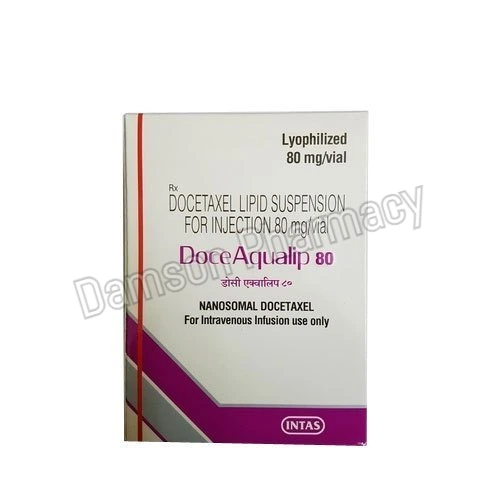
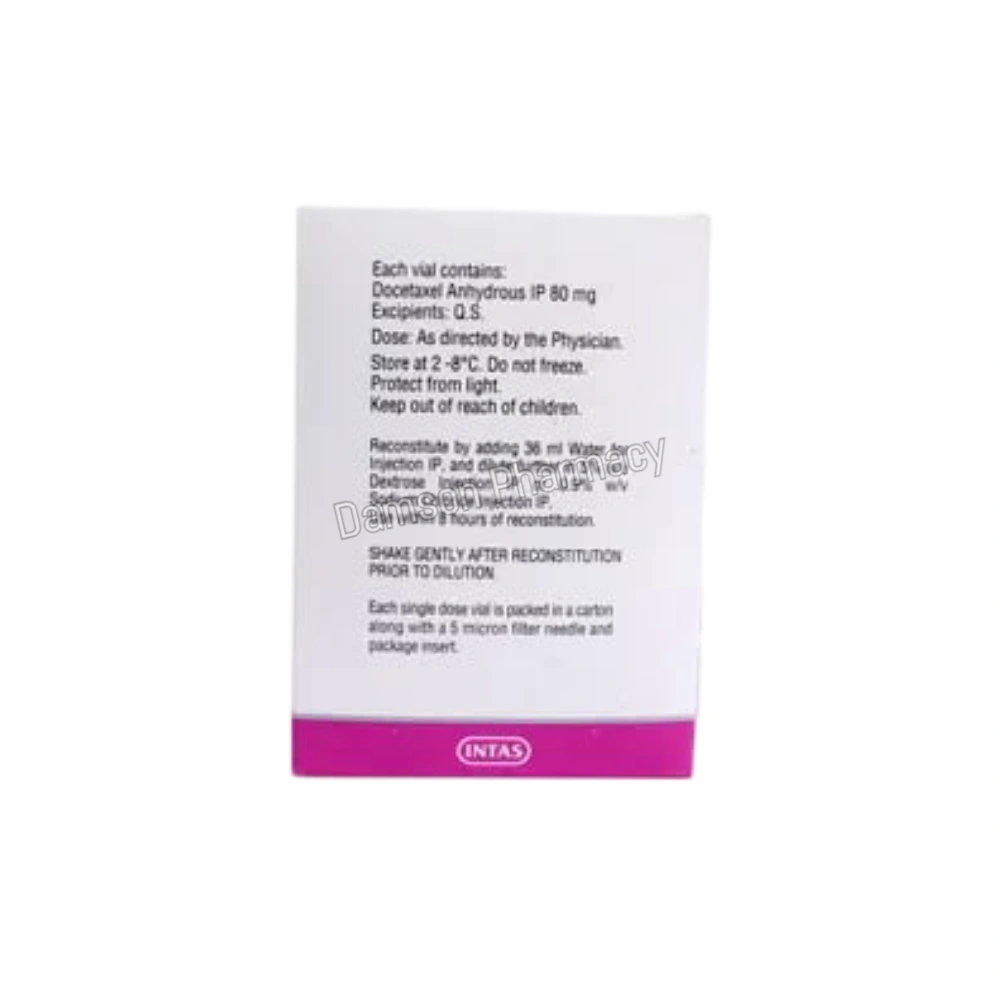
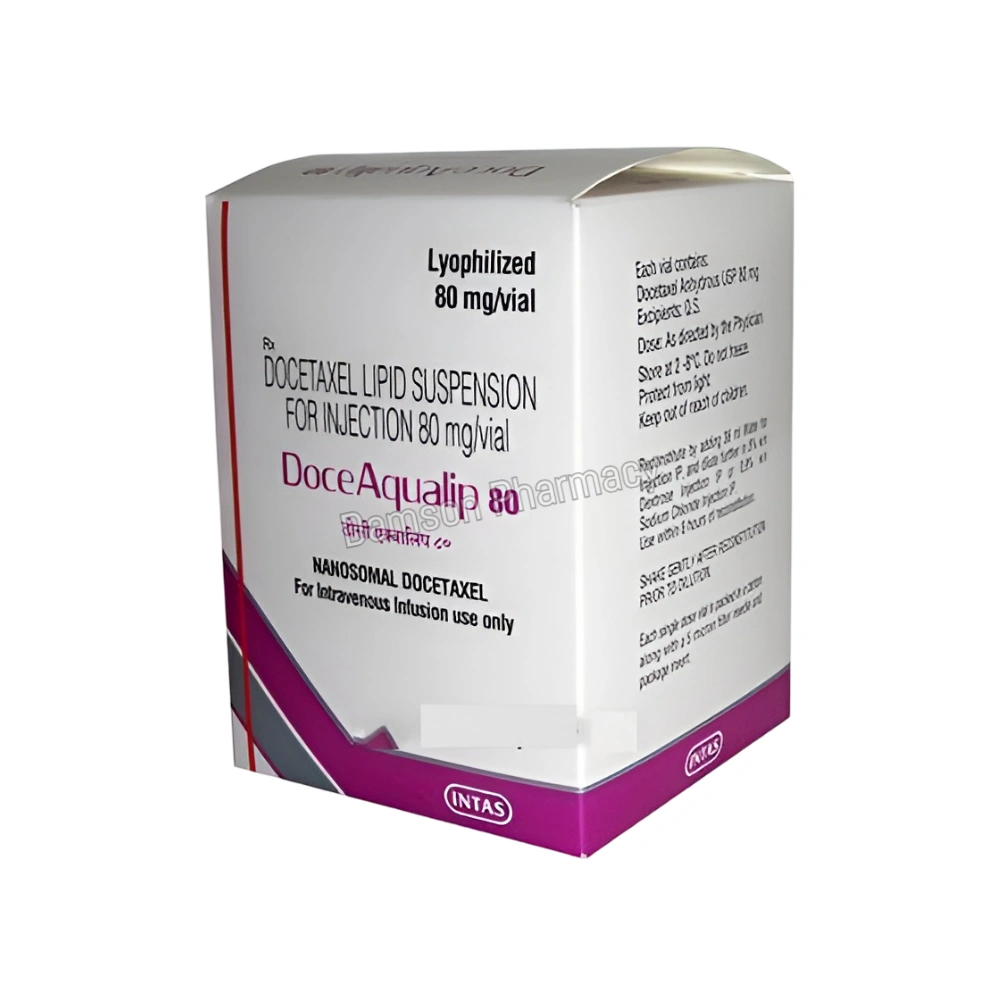
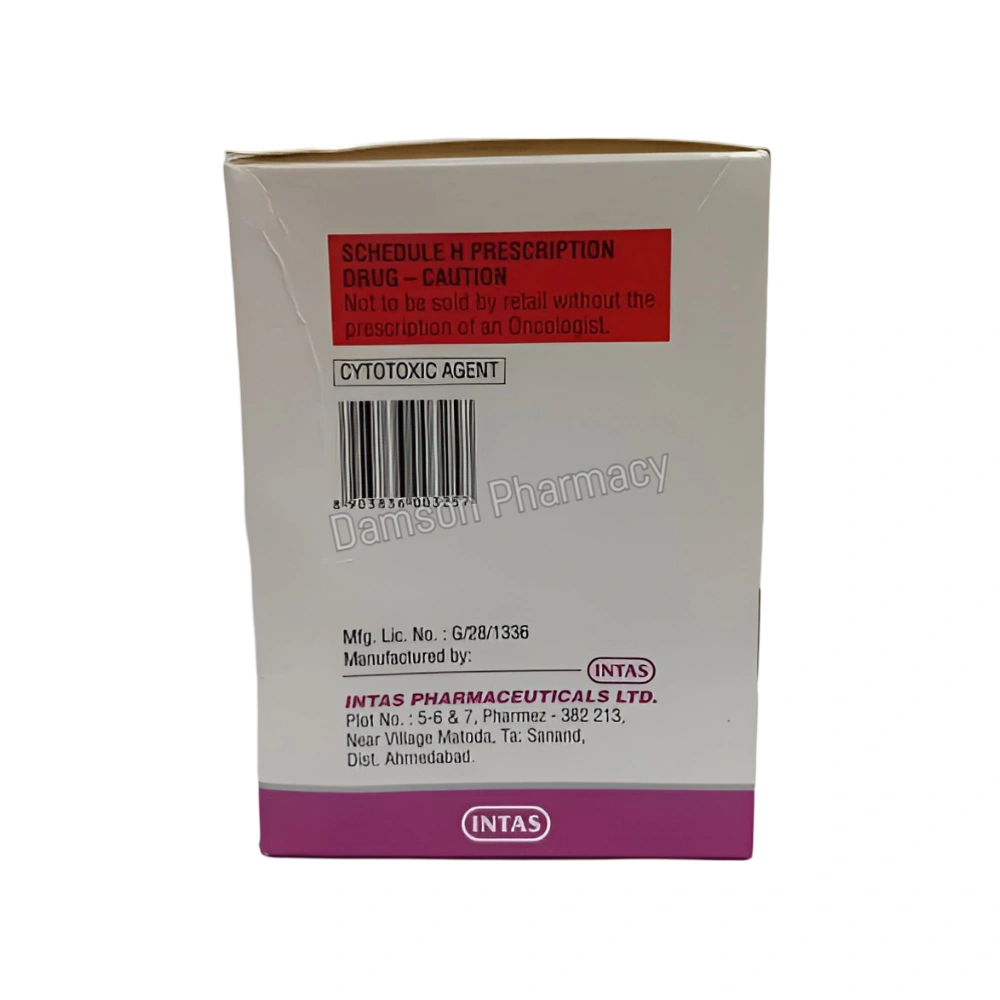
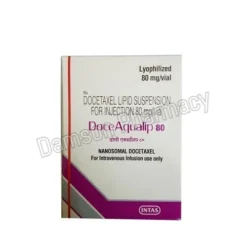
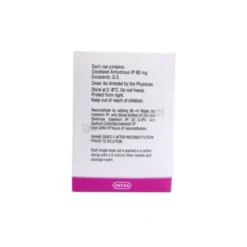
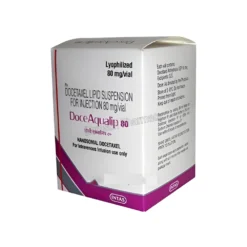
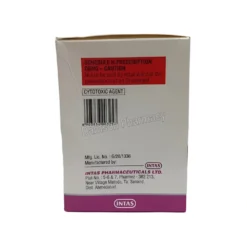
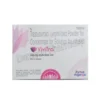
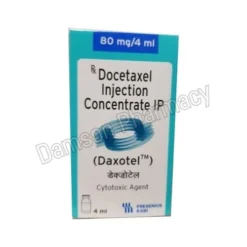
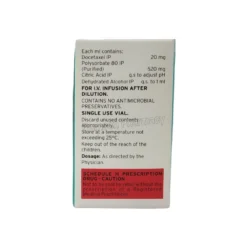

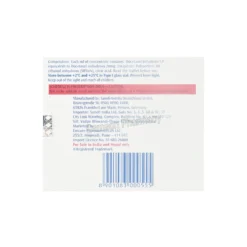
Reviews
There are no reviews yet.